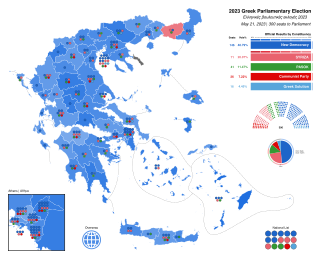
The President of Greece, officially the President of the Hellenic Republic, commonly referred to in Greek as the President of the Republic, is the head of state of Greece. The President is elected by the Hellenic Parliament; the role has been mainly ceremonial since the 1986 constitutional reform. The office was formally established by the Constitution of Greece in 1975, but has antecedents in the Second Hellenic Republic of 1924–1935 and the Greek junta in 1973–1974 which predated the transition to the current Third Hellenic Republic. The incumbent, since 13 March 2020, is Katerina Sakellaropoulou, the country's first female president.
Same-sex marriage has been legal in Greece since 16 February 2024. In July 2023, Prime Minister Kyriakos Mitsotakis, head of the re-elected New Democracy party, announced his government's intention to legalise same-sex marriage. Its legalisation was part of an action plan for LGBT equality, which was drafted by a special committee appointed by Mitsotakis in 2021. Legislation was introduced to the Hellenic Parliament on 1 February 2024 and passed on 15 February by 176 votes to 76. The bill was signed into law by President Katerina Sakellaropoulou and took effect upon publication in the Government Gazette on 16 February. Polling suggests that a majority of Greeks support the legal recognition of same-sex marriage. Greece was the 16th member state of the European Union, the 21st country in Europe, and the 36th in the world to allow same-sex couples to marry.

Prokopios "Prokopis" Pavlopoulos is a Greek retired politician, who served as the president of Greece from 2015 to 2020. A member of New Democracy, he previously was Minister of the Interior from 2004 to 2009. He was succeeded by Katerina Sakellaropoulou on 13 March 2020, who became the first woman to serve as President of Greece.

The Third Hellenic Republic is the period in modern Greek history that stretches from 1974, with the fall of the Greek military junta and the final confirmation of the abolishment of the Greek monarchy, to the present day.

The River was a centrist and social-liberal political party in Greece. The party was founded in February 2014 by Stavros Theodorakis. The party did not run in the 2019 elections and had no seats in the Hellenic Parliament.

Indirect presidential elections were held in Greece in December 2014 and February 2015 for the succession to Karolos Papoulias as President of the Hellenic Republic. The candidate of the ND–PASOK government, Stavros Dimas, failed to secure the required majority of MPs of the Hellenic Parliament in the first three rounds of voting in December. According to the provisions of the Constitution of Greece, a snap election was held on 25 January 2015, which was won by the left-wing Syriza party. Following the convening of the new Parliament, the presidential election resumed. On 18 February 2015, veteran ND politician Prokopis Pavlopoulos, backed by the Syriza-ANEL coalition government, was elected with 233 votes.

Parliamentary elections were held in Greece on Sunday, 20 September 2015, following Prime Minister Alexis Tsipras' announced resignation on 20 August. At stake were all 300 seats in the Hellenic Parliament. This was a snap election, the sixth since 2007, since new elections were not due until February 2019.

The PASOK – Movement for Change is a political alliance in Greece, which was founded in March 2018, initially as "Movement for Change", mainly affiliated with the centre-left of the political spectrum. It includes the Panhellenic Socialist Movement (PASOK) and Movement of Democratic Socialists (KIDISO).
The European Realistic Disobedience Front, or MeRA25, is a left-wing Greek political party founded in 2018. Its founder and General Secretary is former Syriza MP and Finance Minister Yanis Varoufakis. MeRa25 is part of the Democracy in Europe Movement 2025 (DiEM25), the European Spring, and the Progressive International. Τhe movement sets the horizon for the year 2025 to draft a democratic constitution that will replace all the European treaties that are in force today. Yet, it failed to elect representatives in both the 2019 and 2024 European elections. A party of the same name (MERA25), allied with the Greek party, was founded in Germany in 2021.

Snap parliamentary elections were held in Greece on 21 May 2023. All 300 seats in the Hellenic Parliament were contested. They were the first elections since 1990 not to be held under a bonus seats system, due to amendments to the electoral law made in 2016. Instead, a purely proportional system was used.
The Greek Solution is a political party in Greece founded by Kyriakos Velopoulos. The party is right-wing to far-right and has been described as ideologically ultranationalist, national conservative, and right-wing populist. The party first entered the European Parliament when it got 4.18% of the vote in the 2019 European Parliament election in Greece, winning one seat and the Hellenic Parliament when it garnered 3.7% of the vote in the 2019 Greek legislative election

Konstantinos Tasoulas is a Greek politician and lawyer, who served as President of the Hellenic Parliament from 2019 to 2025. A member of the New Democracy party, he has been an MP for Ioannina from 2000 to 2025.

Katerina N. Sakellaropoulou is a Greek judge who has been the president of Greece since 13 March 2020. She was elected by the Hellenic Parliament to succeed Prokopis Pavlopoulos on 22 January 2020. Prior to her election as president, Sakellaropoulou served as president of the Council of State, the highest administrative court of Greece. She is the country's first female president.
Thanassis Theocharopoulos is an agricultural economist, Greek politician and last chairman of the Democratic Left (DIMAR). In 2019 he served as Tourism Minister for Syriza.

Snap parliamentary elections were held in Greece on 25 June 2023. All 300 seats in the Hellenic Parliament were contested. Prime Minister Kyriakos Mitsotakis called for the snap vote after the May 2023 elections did not result in any party gaining a majority, although his centre-right New Democracy made unanticipated gains and increased its share of the vote. As a result, no coalition government was formed by any of the parties eligible to do so.

The New Left is a centre-left to left-wing democratic socialist political party in the Hellenic Parliament. It was founded on 4 December 2023 by eleven independent MPs who left the Syriza party. The president of the parliamentary group is Alexis Haritsis. The New Left officially became a party on 3 March 2024 after its founding conference.
The 2008 Leadership election of Synaspismos took place on 10 February 2008, during its 5th Congress. The two candidates were: Alexis Tsipras and Fotis Kouvelis. Tsipras won with 840 votes, while Kouvelis earned 342 votes, while 14 members voted blank or invalid.
An indirect presidential election was held in Greece on 25 January 2025 for the president of the Hellenic Republic. A second round was held on 31 January 2025 after no candidate won a majority in the Hellenic Parliament.

The 2023 Athens Municipal election was held on 8 October 2023 to elect the mayor of Athens as a part of the 2023 Greek Local elections. It moved to a second round run-off that took place a week later, on 15 October, between incumbent Kostas Bakoyannis backed by ND and Haris Doukas backed by PASOK and Syriza.

![.mw-parser-output figure[typeof="mw:File/Thumb"] .image-key>ol{margin-left:1.3em;margin-top:0}.mw-parser-output figure[typeof="mw:File/Thumb"] .image-key>ul{margin-top:0}.mw-parser-output figure[typeof="mw:File/Thumb"] .image-key li{page-break-inside:avoid;break-inside:avoid-column}@media(min-width:300px){.mw-parser-output figure[typeof="mw:File/Thumb"] .image-key,.mw-parser-output figure[typeof="mw:File/Thumb"] .image-key-wide{column-count:2}.mw-parser-output figure[typeof="mw:File/Thumb"] .image-key-narrow{column-count:1}}@media(min-width:450px){.mw-parser-output figure[typeof="mw:File/Thumb"] .image-key-wide{column-count:3}}
.mw-parser-output .plainlist ol,.mw-parser-output .plainlist ul{line-height:inherit;list-style:none;margin:0;padding:0}.mw-parser-output .plainlist ol li,.mw-parser-output .plainlist ul li{margin-bottom:0}
.mw-parser-output .legend{page-break-inside:avoid;break-inside:avoid-column}.mw-parser-output .legend-color{display:inline-block;min-width:1.25em;height:1.25em;line-height:1.25;margin:1px 0;text-align:center;border:1px solid black;background-color:transparent;color:black}.mw-parser-output .legend-text{}
New Democracy: 158
Syriza: 86
KINAL: 22
KKE: 15
EL: 10
MeRA25: 9 Grece Vouli 2019.svg](http://upload.wikimedia.org/wikipedia/commons/thumb/4/4e/Gr%C3%A8ce_Vouli_2019.svg/250px-Gr%C3%A8ce_Vouli_2019.svg.png)












